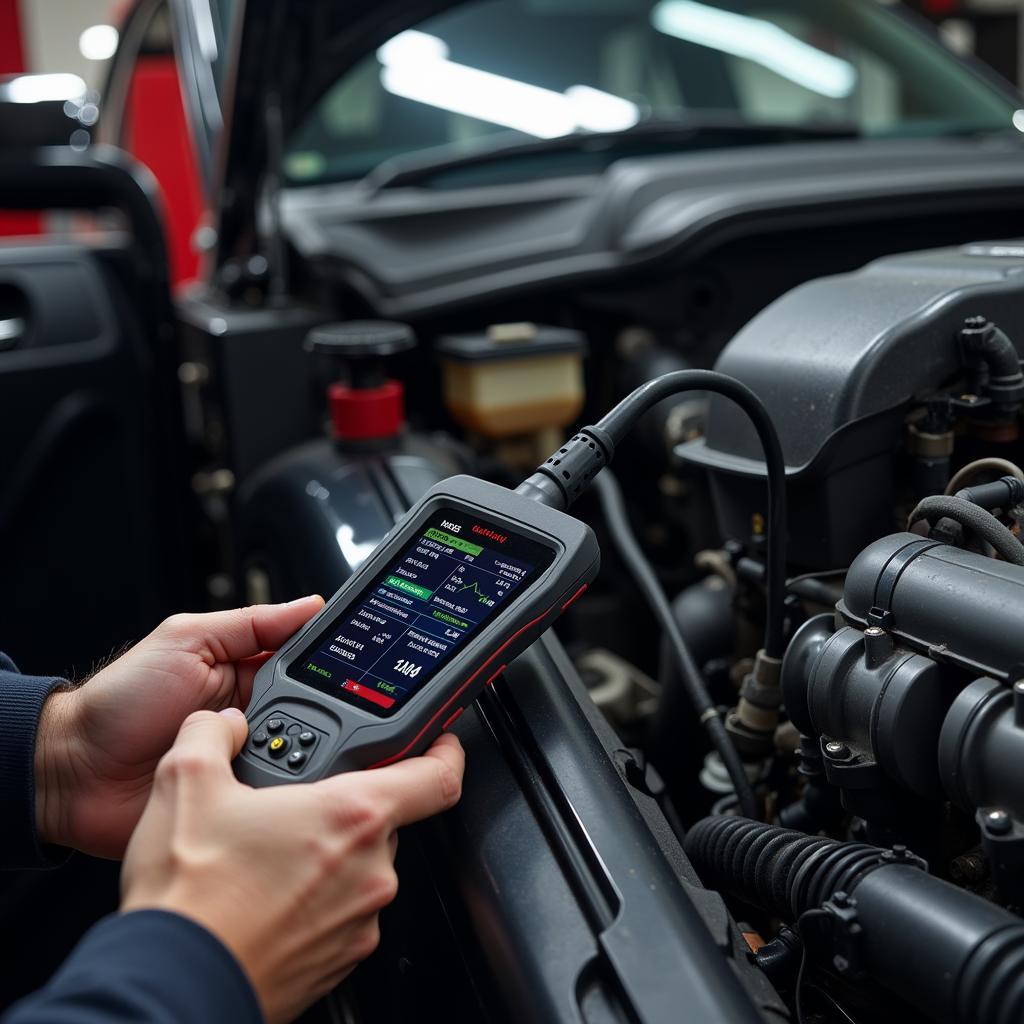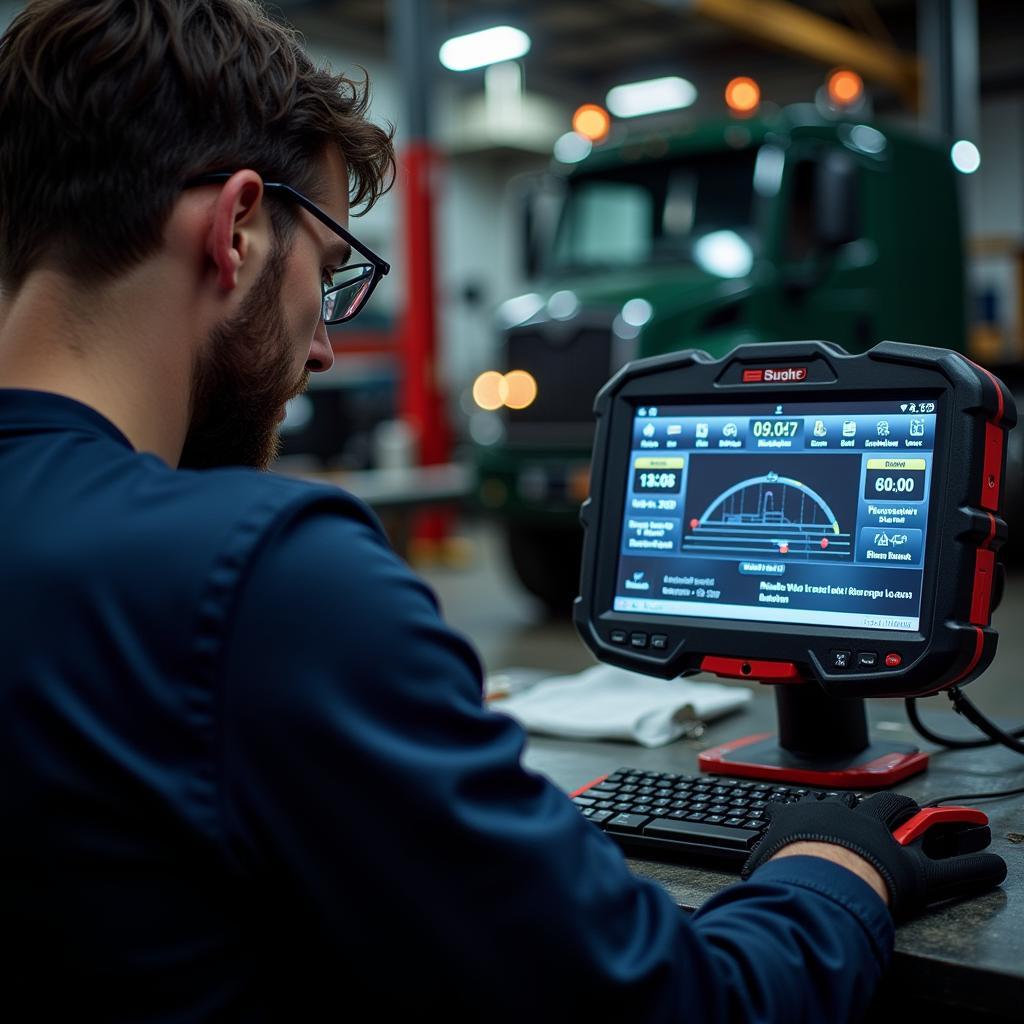The world of automotive repair has come a long way from trial-and-error troubleshooting. Today, a powerful car and truck diagnostic tool is essential for mechanics and vehicle owners alike, providing a window into the complex network of electronic systems within modern vehicles. This comprehensive guide delves into the intricacies of these tools, empowering you to make informed decisions when choosing, using, and maximizing their potential.
 Car and Truck Diagnostic Tool Connected to a Car
Car and Truck Diagnostic Tool Connected to a Car
Understanding the Power of Diagnostic Tools
Gone are the days when mechanics relied solely on experience and intuition. Car and truck diagnostic tools, also known as OBD2 scanners, have revolutionized the way we diagnose and repair vehicles. These sophisticated devices connect to the vehicle’s onboard computer, retrieving and interpreting data from various systems, including:
- Engine and transmission
- Anti-lock braking system (ABS)
- Airbag system (SRS)
- Emission control system
- and much more…
By accessing this wealth of information, these tools can pinpoint faults with remarkable accuracy, saving time and money on unnecessary repairs.
Types of Car and Truck Diagnostic Tools
The market offers a wide array of diagnostic tools, each catering to different needs and budgets. Here’s a breakdown:
1. Basic Code Readers
Ideal for DIY enthusiasts, these affordable devices primarily read and clear basic fault codes (also known as Diagnostic Trouble Codes or DTCs). While they lack advanced features, they serve as a great entry point into the world of vehicle diagnostics.
2. Handheld Scanners
Offering a step up from basic code readers, handheld scanners provide more in-depth information, including live data streams, freeze-frame data, and some bi-directional control capabilities. These features enable you to monitor sensor readings in real-time and even perform simple tests.
3. Professional-Grade Scanners
Utilized by professional mechanics and workshops, these high-end tools boast advanced functionalities, extensive vehicle coverage, and comprehensive software suites. They offer the most accurate diagnostics, complex coding capabilities, and often come bundled with technical support and regular updates.
 Mechanic Using a Diagnostic Tool on a Truck
Mechanic Using a Diagnostic Tool on a Truck
Choosing the Right Tool for Your Needs
Selecting the appropriate diagnostic tool depends on your specific requirements. Consider the following factors:
- Vehicle Compatibility: Ensure the tool supports the make, model, and year of your vehicle(s).
- Features and Functionality: Determine the level of detail and control you need. Are basic code reading and clearing sufficient, or do you require live data, bi-directional controls, and advanced programming options?
- Budget: Set a realistic budget and explore options within your price range. Remember to consider long-term value, as investing in a more capable tool might prove more cost-effective in the long run.
- User Friendliness: Opt for a tool with an intuitive interface and easy-to-understand menus. Look for features like a built-in troubleshooting guide or online resources.
- Brand Reputation and Support: Choose a reputable brand known for reliability and excellent customer support. Check for warranty information and software update options.
If you’re seeking to enhance your automotive knowledge and skills, consider exploring free car diagnostic courses online. These courses can provide a solid foundation in vehicle diagnostics and familiarize you with different types of tools and techniques.
Beyond Diagnosis: The Future of Diagnostic Tools
Car and truck diagnostic tools continue to evolve at a rapid pace, driven by advancements in automotive technology and software development. The future holds exciting possibilities, including:
- Predictive Maintenance: By analyzing data trends and patterns, these tools can predict potential issues before they escalate, minimizing downtime and expensive repairs.
- Cloud Integration: Cloud-based platforms allow for seamless data sharing, remote diagnostics, and access to vast databases of technical information.
- Augmented Reality (AR) Support: Imagine overlaying real-time data and repair instructions directly onto your field of view through AR glasses. This technology is already being explored and promises to revolutionize the way mechanics work.
 Future Car Diagnostic Tool with Augmented Reality
Future Car Diagnostic Tool with Augmented Reality
Conclusion
Car and truck diagnostic tools are indispensable for anyone involved in vehicle maintenance and repair. From DIY enthusiasts to professional mechanics, these tools empower users to understand, diagnose, and resolve vehicle issues with unprecedented efficiency and accuracy. By staying informed about the latest advancements and choosing the right tool for your needs, you can unlock the full potential of these powerful devices and stay ahead of the curve in the ever-evolving world of automotive technology.
FAQs
Q: Can I use a car diagnostic tool on a truck, or vice versa?
A: While some tools offer universal compatibility, it’s crucial to choose a tool specifically designed to work with your vehicle’s make, model, and year.
Q: What is the average cost of a car diagnostic test?
A: The average cost of car diagnostic in south africa and other regions can vary depending on the location, the complexity of the issue, and the type of diagnostic tool used.
Q: Can diagnostic tools fix car problems?
A: No, these tools primarily diagnose issues. They pinpoint the root cause of a problem, guiding you towards the appropriate repair.
Q: Is it worth investing in a professional-grade diagnostic tool for personal use?
A: For most DIY enthusiasts, a mid-range handheld scanner offers a good balance between features and affordability. However, if you work on multiple vehicles or require advanced functionality, a professional-grade tool might be a worthwhile investment.
Q: How often should I use a car diagnostic tool?
A: It’s recommended to perform a diagnostic scan at least once a year or whenever you experience unusual vehicle behavior.

Leave a Reply